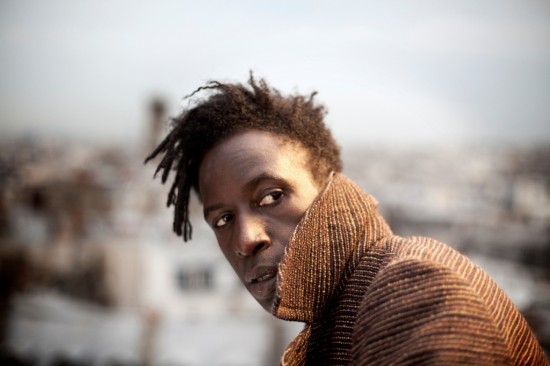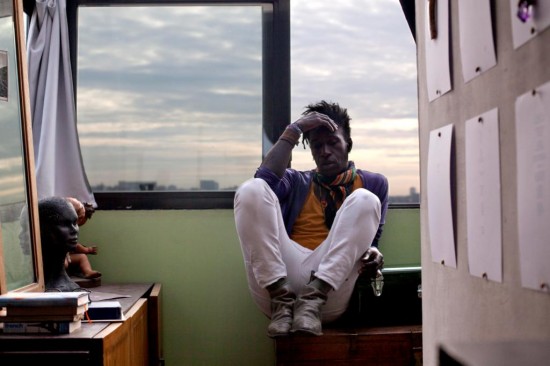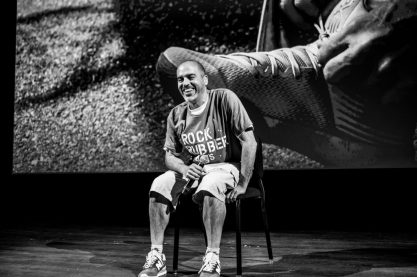Interviews
INTERVIEW: Saul Williams

The term Renaissance Man should not be thrown around lightly. There are so many people who are "multi-taskers," but not even one of their tasks can make a visual impact on the world. That's not true with Saul Williams. The actor, poet, writer, and musician has made a decades long career speaking out about racial identity and social justice among other things.
You might remember Saul from his powerful songs (think "List of Demands") or his then groundbreaking release of the album The Inevitable Rise and Liberation of NiggyTardust with Nine Inch Nail's frontman Trent Reznor.
Since then, he's been on a bit of a hiatus. However, this year Saul returns to the limelight with his follow up album Volcanic Sunlight. Released in France initially, the album finds Saul changing his sound slightly but maintaining his political bite.
I recently caught up with Saul via phone from his home in Paris. We talked about the making of Volcanic Sunlight, why he went with a traditional album release, the changing music climate and his thoughts on the Occupy Wall Street movement.
The last time I spoke with you, you were in Brooklyn. Now you’re in Paris. What was the motivation for the move?
I moved to Paris to record Volcanic Sunlight. I recorded the demos before I moved over here and there was a producer over here named Renaud Létang that I loved, and I wanted to work with him on this album, and at the same time I had a friend from New York living over here, and he showed me his place and told me what it cost and I was like “Oh I can do that.”
So after I figured out that it was practical for me to move here.
I remember you telling me how well received you were out there opening for Nine Inch Nails on their European tour. Do you feel like there is more freedom for you to do what you do in Europe? Do you feel like you have more artistic freedom to do what you do?
Not necessarily, no. Artistic freedom is something that lives inside of me. I look for it wherever I am. I feel like I need to express myself wherever the city may be in New York or over here in France.
It may be true that artists in a socialist structure are helped and aided by the government, but I’m not a citizen of France so I don’t get to experience that, and I don’t really necessarily feel any better received here than I was in The States at all. It was just a matter of my personal tastes, of wanting to stretch my horizons a bit, and learn the language.
I also have a daughter living here with me. She’s going to be thirteen and it’s just cool to give her that experience.
So getting back to the album, Volcanic Sunlight. I see a lot of growth from your last projects. What was the recording process with this album and did you feel like you have to do anything different from your last album?
Well, the process was quite different from how I've had to work with the last albums. Basically, I just stayed in the studio here. I played the demos to Renaud and he loved them. We wanted to keep the vibe and the spirit of the demos alive but take it up to another level of quality.
I stayed in the studio for a year recording Volcanic Sunlight. And that is a gift that I don’t think many modern day artists get to have. I played all of the instruments myself, I used real percussions and horns. Being in the studio for that amount of time and working with real musicians made me feel really lucky and it was just a really positive experience for myself.
[youtube]http://www.youtube.com/watch?v=eoAOX3oy6tA[/youtube]
I remember when NiggyTardust dropped in 2007, and you guys did a really interesting release for it where it was distributed free or for a donation, and I see that this is more of a traditional release through a major label (Sony Music). What was the decision for the change? Were you satisfied with the way you released NiggyTardust?
When NiggyTardust dropped, what we did was original and unique, and if I did the same thing now—after one thousand and one artists have done the same thing—it would no longer have that originality.
Secondly, NiggyTardust is mainly electronic. That means that Trent, Atticus [Ross] and I all worked on our computers separately. The album was recorded electronically, even the vocals were recorded right into my computer. So with it being an electronic album, we felt that it was perfect for it to go straight from that format into a virtual medium.
Volcanic Sunlight on the other hand is the amalgam of electronic and non-electronic instruments. In order for me to fund the process, I had to think about it like a movie. I had to think of how I could find the funding to get real horn players for instance. I needed access to real musicians and I needed a way to pay them.
So I needed the money upfront. I needed a recording budget. So I worked like a director would in finding a production company, and that pretty much solidified the fact that it would come out in a more traditional format.
I feel you.
But NiggyTardust was one of a kind. We put that album out 10 days after we decided that we wanted to put it out. It was that immediate, and it was a full test of what was available to us. That’s where we are right now in terms of technology and that was exciting.
What was also exciting is that I could sidestep the record executives who were nervous. They didn’t know if it was rock, hip-hop, industrial or what. They didn’t know what box it belonged to and how to fill it.
One of my main concerns is that why should the industry constantly underestimate the intelligence of the audience? I think that is more so an American trait than a global one. [Releasing the album online] was my way of overcoming that obstacle. By making it free and giving it away we proved that we didn’t need them in order to do [put the album out].
But in terms of Volcanic Sunlight, I didn’t want to fight the same fight twice.

Going back to that statement about the record labels and your difficulties in the past. Do you think the culture has caught up, especially in The States? When you started your thing, a lot of people didn’t know what to make of you. But now it seems acceptable and even encouraged for people of color to be in their own lane. Are you seeing that freedom, or are you still getting resistance?
I definitely see that, and I don’t think it’s about people being given more freedom, I think that people themselves are taking more freedom.
On one hand I think it has a lot to do with identity issues. So much revolves around the idea of race, and color, and gender. A lot of times people in the past have been expected to live up to other people’s ideas of what category they are boxed into. So me as a young Black kid from New York in the 80s, I’m supposed to be a rapper.
But I didn’t want to rap.
So I hit my head against a lot of ceilings and floors when I was meeting with record executives who wanted me to confine my music to the infrastructure of hip-hop. But I was telling them that that structure is not yet defined. And they told me that people didn’t want that.
But when I would go back home to Brooklyn I would see that people did want that. You just had to give it to them.
Now I think that people are naturally a bit more open. That’s why the full title of NiggyTardust is The Inevitable Rise and Liberation of NiggyTardust because you can’t stop the fact that we are rising and evolving as a species of humanity. We will not always look at ourselves as Black, or White. We can oppose the obstaices of self-definition that are imposed on us by society at large and simply be ourselves.
It’s awesome now that artists are finding it within themselves to explore, whether it’s young urban kids trying to re-imagine their connection to punk rock, or suburban kids re-imagining their connection to hip-hop. It’s all cross-pollinating now.
Exactly. Moving on I’m curious of your opinion on what seems to be a year of social revolt. From the Arab Spring, to Occupy Wall Street, to the riots in London. As someone who has always spoke up against injustice, how do you feel seeing this?
This is the thing that we [artists and poets] have been looking to inspire in the hearts and minds of the people since...forever. From what I can remember, every poetry reading I ever attended in the 90s...this is what we were trying to inspire people to do. To speak up. To use their voice. To inspire youth to take to the streets and scream “THIS IS ENOUGH!”
The fact that it’s finally happening is amazing. All of that started in the Middle East and in Northern Africa at the top of this year. I see this as a direct relation to the Arab Spring. It’s more than just bailouts to the bankers. I think it’s all of these injustices that are happening globally. I think people are stepping up and realizing that if we do not take the power from the people who define what “power” is supposed to be about, then we will continue to be victims.
We have to take advantage of our times, and in order to do that we have to overthrow some of the cowards in control. So seeing young people stand up, whether its in Oakland, or in New York or Nashville is truly inspiring. And for me, it’s surreal, because this is exactly what we have been writing about and trying to do with our work.
It’s an interesting time. A powerful time.
Volcanic Sunlight is in stores now. Buy from iTunes.
[youtube]http://www.youtube.com/watch?v=0_vUmvAXaWc[/youtube]
